Daughters of the Witching Hill
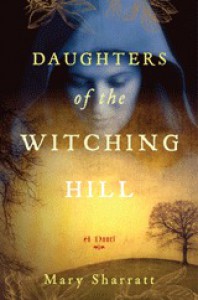 Started a little slow for me but I really enjoyed the second half, told from Alizon's point of view.
Started a little slow for me but I really enjoyed the second half, told from Alizon's point of view.
The Traitor's Wife: A Novel of the Reign of Edward II
 I have mixed feelings about this book. My main problem is character portrayal. I know that we are supposed to sympathize with Eleanor and the Despensers, but I found nothing to like about them in spite of the author’s best efforts. Eleanor is weak, willfully blind to all of her husband’s and uncle’s many faults, and is portrayed as a dim bulb in all respects. I think the book would have really benefited from Eleanor being part of, or at least aware of, all the action and intrigue going on around her. After all, that is where all the tension and suspense comes from, and a main character who knows less than the reader isn’t very helpful. I also found the villains (Isabella and Mortimer) to be completely one-dimensional and unbelievable. I felt the main characters suffered from the author’s attempts to so clearly draw the line between “good” and “bad.”
I have mixed feelings about this book. My main problem is character portrayal. I know that we are supposed to sympathize with Eleanor and the Despensers, but I found nothing to like about them in spite of the author’s best efforts. Eleanor is weak, willfully blind to all of her husband’s and uncle’s many faults, and is portrayed as a dim bulb in all respects. I think the book would have really benefited from Eleanor being part of, or at least aware of, all the action and intrigue going on around her. After all, that is where all the tension and suspense comes from, and a main character who knows less than the reader isn’t very helpful. I also found the villains (Isabella and Mortimer) to be completely one-dimensional and unbelievable. I felt the main characters suffered from the author’s attempts to so clearly draw the line between “good” and “bad.” My other gripe was that there weren’t many details of life in the Middle Ages, and the setting never really came alive for me.
On the other hand, the story is fascinating and complex. I really appreciated the Afterward. I liked that the author tried to be as factual as possible and didn’t change any of the details (as far as I know) to suit her story. Also, in spite of being frustrated with Eleanor as a character, I did appreciate that the author didn’t try to make her a modern feminist transported back to medieval England as so many authors do. Flawed as she was, I did find myself caring what happened to her in spite of not liking her much. 2.5 stars.
When She Woke

This book has a very interesting, thought provoking premise, although it is (intentionally?) very similar to other works in the dystopian genre, namely A Handmaid’s Tale. I thought Hannah was an excellent protagonist and really enjoyed her journey from meek, sheltered fundamentalist to a strong character who learns to question her basic beliefs and those of society. Overall the book had a very strong beginning and solid middle, but the ending was disappointing. An event that occurred towards the end of the book seemed to come out of left field, and I thought Hannah’s actions were totally out of character. Also, I was waiting for Hannah to realize that her reverend was not a good person and to have some sort of confrontation with him and was disappointed when this never happened. Even though I mostly agree with the author’s political views, I wish she had been a bit subtler about presenting her agenda and allowed the reader to come to their own conclusions.
A Dance With Dragons (A Song of Ice and Fire, #5)
 This book frustrated me. I preordered it, which I almost never do, and dove right in. It took me 2.5 weeks to finish. Granted it is a 1000-or-so page book, but still. GRRM needs to tighten up his story, and quick. Some chapters were great, some were mediocre, and some I found downright tedious (most of the Dany ones, sadly, and some Tyrion as well, along with most of the new characters). The best were the Theon chapters, which was shocking. It is not a good sign when you see a generic title chapter instead of a name and inwardly groan. I actually ended up skimming some of them (Quentyn I’m talking to you) because they were literally putting me to sleep.
This book frustrated me. I preordered it, which I almost never do, and dove right in. It took me 2.5 weeks to finish. Granted it is a 1000-or-so page book, but still. GRRM needs to tighten up his story, and quick. Some chapters were great, some were mediocre, and some I found downright tedious (most of the Dany ones, sadly, and some Tyrion as well, along with most of the new characters). The best were the Theon chapters, which was shocking. It is not a good sign when you see a generic title chapter instead of a name and inwardly groan. I actually ended up skimming some of them (Quentyn I’m talking to you) because they were literally putting me to sleep. I absolutely loved the first three books in this series, as do most fans I’m sure. The fourth was merely okay, mostly due to the inclusion of numerous new characters. The thing is, I don’t care about the new characters, (especially the Ironborn, ugh), I want my old favorites back. This book is sadly more of the same, only now old established characters are becoming boring as well. The story (and world) keeps getting bigger and bigger, and as this is the 5th book out of 7, it should be getting smaller and tighter, drawing up to the conclusion. I really think the last two books should have been combined and about half the extraneous material cut out. As many other reviews have stated, not much actually happens in this book, just a ton of worldbuilding, wandering, characters *almost* meeting, and it ends with numerous dangling plotlines. As I said, frustrating. I want to give it 2.5 stars but will bump it up to 3 as I did enjoy parts and I feel the series as a whole is excellent. I hope the next book is up to the standards of the first three.
The Queen's Man: A Medieval Mystery (Medieval Mysteries)
 A light, entertaining read with good characters and a believable setting full of details about daily life in medieval England. Good escapism, not too memorable in the long run but fun. I will read the rest of the series.
A light, entertaining read with good characters and a believable setting full of details about daily life in medieval England. Good escapism, not too memorable in the long run but fun. I will read the rest of the series.
Galore
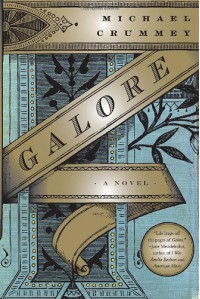
I was at first very nervous about reading this book at first because all I knew about it was that it had been compared to One Hundred Years of Solitude, which is one of only a small handful of books I’ve never been able to force myself to finish. I was very pleasantly surprised, because I absolutely loved Galore from start to finish. This is an extremely well crafted book with beautiful language; a dreamy, almost otherworldly quality to the writing; and characters that are tragic and complex, particularly the women. My only complaint would be that since the story has so many characters, (and I did have to refer often to the family tree, especially in the second half) I got more attached to some than others and was sorry to see them disappear from the book. This book has no central protagonist and jumps around in time and from character to character. While I think that might bother some people, I thought it was one of the best things about the story. I found the entirety of Part 1 to be a bit more compelling than Part 2 because it dealt more with the folklore and history of the area while Part 2 is more modern and very much part of the 20th century, although I enjoyed both. This is one of the only books I’ve read that caused me to put the book down for a moment midway through and think “Wow, this is a fantastic book” and then go back and re-read passages because I didn’t want it to end. All in all, I absolutely loved this book and would highly recommend it. I plan on looking for more of the author’s books as well.
Tam Lin
 Wow this book was annoying. First, Janet was a pretentious, insufferable, snobby, know-it-all. I found it impossible to relate to her and hard to believe that she had any friends at all considering how she treated everyone. Every page had her saying something “acidly” or “sharply” or stating how annoyed or irritated she was over some tiny detail or other. I could have accepted this as part of her character arc except for the fact that Janet on the last page is the exact same as Janet on the first page of the novel. She underwent absolutely zero personal growth and didn’t change at all. Seriously, I hated Janet so much.
Wow this book was annoying. First, Janet was a pretentious, insufferable, snobby, know-it-all. I found it impossible to relate to her and hard to believe that she had any friends at all considering how she treated everyone. Every page had her saying something “acidly” or “sharply” or stating how annoyed or irritated she was over some tiny detail or other. I could have accepted this as part of her character arc except for the fact that Janet on the last page is the exact same as Janet on the first page of the novel. She underwent absolutely zero personal growth and didn’t change at all. Seriously, I hated Janet so much. This book was supposedly written as part of the Fairy Tale Series, but I get the impression that Pamela Dean had her diary from college hanging around, changed the protagonists name to Janet, added in a couple fairy and ghost sightings, tacked on the ending from the ballad, and called it a day. The “romantic relationships,” if you want to call them that, between the roommates and the Classics guys were very detached and unbelievable. All they did was have quotation battles, make private jokes that the reader is never made privy to, and occasionally have sex, but there is absolutely no warmth, passion, or even companionship in any of the relationships. I don’t know why any of those girls put up with them for as long as they did.
There was no modernization, interpretation, or adaption of the ballad, no symbolism either. There was no subtlety in the references to the fairies or “Classics majors.” I found it quite jarring that the ending of the ballad was pretty much tacked on word-for-word at the end after 400 pages of in-depth breakdowns of college English courses and literary allusions and where Janet ate breakfast and what she ate. The ending felt very hurried and sloppily written. I didn’t buy that Janet and Thomas were suddenly soul-mates and ready for a baby and marriage unless 400 pages of alternately discussing their mutual dislike of Tina and bickering is meant to stand for their undying passion for one another. The ghost story and the mystery of Peg were completely abandoned. The subplot concerning the pregnant girls could have been interesting, but it was also lazily explained. Nick, who was a very important character for the first part of the book, completely disappears after Janet finally dumps him. The whole story felt like it needed a strong editor and a re-write to address all these issues. Clearly, plot and characterization came in a distant second to coming up with obscure literary references and yet another way to show what a dumb-ass Tina is. Oh, and also Dean needs to quit it with the semi-colon abuse.
Unforgivably pretentious, self-indulgent, and tedious.
Galway Bay
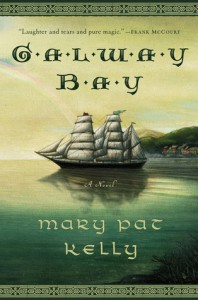
I really enjoyed this one. It is a sweeping saga of the Kelly family who survives the potato famine in Ireland and makes a new life in Chicago. It is a bleak story at times but one of survival and human triumph as well. I found all the characters to be realistic and I really cared about them, particularly Honora, Michael, and Maire. The horrors of the potato famine and the absolutely inhumane treatment of the Irish by their English landlords were well told, although the author does tug at the heartstrings a bit too much. The book is also full of Irish legends and stories that add a touch of magic and enchantment to the story. I did find the first part of the story that takes place in Ireland to be more engaging than the second half in Chicago, but it was a good read all the way through.
Catherine, Called Birdy (Summer Reading Edition)
 I fell in love with this book as a child, and decided to revisit it now as an adult who loves medieval historical fiction. I found Catherine to be every bit as enjoyable as I’d remembered. The diary format is both informative and hilarious concerning everyday life in the Middle Ages and also delightfully disgusting at times (mucking out the privy, anyone?). The story is charming and the historical details accurate. Highly recommended!
I fell in love with this book as a child, and decided to revisit it now as an adult who loves medieval historical fiction. I found Catherine to be every bit as enjoyable as I’d remembered. The diary format is both informative and hilarious concerning everyday life in the Middle Ages and also delightfully disgusting at times (mucking out the privy, anyone?). The story is charming and the historical details accurate. Highly recommended!
The Greatest Knight (William Marshal, #2)
 As someone who greatly enjoys reading about the medieval period, I had been aware of Elizabeth Chadwick’s books for some time but had never been able to get my hands on any due to them not being readily available in the US. I was therefore very happy to see The Greatest Knight for free on the kindle. I really enjoyed it in spite of a rather slow start and will definitely be purchasing more of her books, beginning with The Scarlet Lion which continues the story of William Marshal.
As someone who greatly enjoys reading about the medieval period, I had been aware of Elizabeth Chadwick’s books for some time but had never been able to get my hands on any due to them not being readily available in the US. I was therefore very happy to see The Greatest Knight for free on the kindle. I really enjoyed it in spite of a rather slow start and will definitely be purchasing more of her books, beginning with The Scarlet Lion which continues the story of William Marshal. I did find the beginning to be a bit slow, but it picked up quickly for me once William comes into the service of the Young King Henry. I wish we had seen a bit more of his childhood, considering the incident with King Stephen which is highly dramatic and would have made for a more complete character portrait. I appreciate that Chadwick follows history closely and doesn’t change things around for the sake of her story. I thought all the characters were very well drawn, particularly the royal family, although William and his wife were a bit too good to be true. Eleanor of Aquitaine is probably my favorite historical personage of all time and I was not disappointed in her portrayal at all. She and Henry and their children all felt like real living and breathing people. I did find myself missing several characters after they exited stage left, such as Marguerite the Young Queen and William’s ward Heloise, but it makes sense that since this is William’s story they weren’t seen again. The period setting was very well portrayed and I got a real feel for life in the middle ages. I was a bit worried about how “romancy” the book would be, but I needn’t have worried. There is romance of course, but it was all well done with nary a heaving bosom in sight. Altogether this was a very enjoyable read with great historical details and great supporting characters.
The Tudor Secret (The Elizabeth I Spymaster Chronicles)
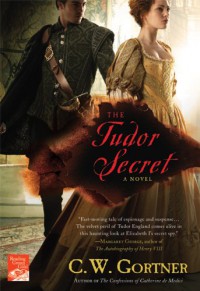
The plot was a bit convoluted at times, but it was mostly a fun read with lots of action and courtly intrigue involving some familiar faces from the Tudor period interspersed with some purely fictional characters. The story was extremely unrealistic which bothered me a bit. For example, when Brendan first comes to court he is depicted as the quintessential farm boy/country bumpkin, but within a matter of hours he has met Princess Elizabeth who trusts him with her life immediately and has become a spy with sensational sword fighting skills, etc. While it’s an expected transformation in fiction, there was little to no actual transition period, and it did not feel organic or believable in such a short time period. Also the romance felt a bit rushed and the character of Kate a bit too modern and clichéd. I did think the writing veered into the juvenile at times as well. I did like the portrayal of the historical characters such as Elizabeth, Mary, and Robert Dudley, and appreciated that the author managed to make them both complex and somewhat sympathetic, especially Mary, who usually fairs pretty badly in depictions of the Tudor period. For some reason, I found myself liking the real historical characters significantly more than the fictional ones. All in all, this was a fast, fun read for someone who enjoys action and royal intrigue in the Tudor period but is not too fussed about realism.
The Virgin in the Ice: The Sixth Chronicle of Brother Cadfael
 I usually find mystery series to be like candy for the brain, fluff that entertains but not much more. This is the second of the Brother Cadfael books I’ve read, and I enjoyed them both immensely and will definitely read more. The writing is very strong and quite beautiful in places, with some of the most evocative setting and period details that I’ve seen in a medieval book. The characters are layered and interesting, very multidimensional but still realistic. This is one to be read slowly and savored, preferably in the winter.
I usually find mystery series to be like candy for the brain, fluff that entertains but not much more. This is the second of the Brother Cadfael books I’ve read, and I enjoyed them both immensely and will definitely read more. The writing is very strong and quite beautiful in places, with some of the most evocative setting and period details that I’ve seen in a medieval book. The characters are layered and interesting, very multidimensional but still realistic. This is one to be read slowly and savored, preferably in the winter.
 This book was more of a 2.5 for me, but I bumped it up to 3 stars because it was mostly enjoyable, if not memorable. The setting of turn-of-the-century New York was nicely done as were the parts dealing with the birth of criminology and forensics. While the two main characters were pretty well drawn, I found that virtually all the male secondary characters blended together. I couldn’t keep them straight or even remember who they were for the most part, which is unusual for me. The only exception was the killer, which brings me to another problem. I thought he was so obviously being set up as the murderer from his first introduction that it couldn’t possibly be him. Well, it was indeed him. Disappointing. The love interest was also quite blah. I thought some of the prose was pretty clunky as well. All in all, I found the mystery to be pretty obvious and the characters flat, but it was still an okay read plot-wise and for the forensic details if you’re into that.
This book was more of a 2.5 for me, but I bumped it up to 3 stars because it was mostly enjoyable, if not memorable. The setting of turn-of-the-century New York was nicely done as were the parts dealing with the birth of criminology and forensics. While the two main characters were pretty well drawn, I found that virtually all the male secondary characters blended together. I couldn’t keep them straight or even remember who they were for the most part, which is unusual for me. The only exception was the killer, which brings me to another problem. I thought he was so obviously being set up as the murderer from his first introduction that it couldn’t possibly be him. Well, it was indeed him. Disappointing. The love interest was also quite blah. I thought some of the prose was pretty clunky as well. All in all, I found the mystery to be pretty obvious and the characters flat, but it was still an okay read plot-wise and for the forensic details if you’re into that.
Autobiography of Henry VIII
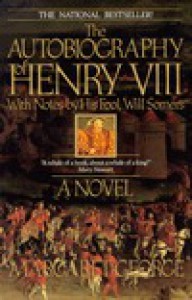 This book has been in my house for years, staring at me, waiting to be read. I was intimidated by it, due to both its tremendous size and well, the size of its subject. I am not a Tudor expert by any means, but I know the basics of Henry’s life and the lives of his hapless wives. This book was all from Henry’s point of view, obviously, and provided an interesting take on this most notorious of kings. I thought the writing was excellent and there were some truly beautiful passages. Most of the major characters were well delineated, even though I will admit to getting some of the Thomas’s confused towards the end. Honestly, I found the end of the book to be a bit of a slog. I’m not sure if it was Henry’s age and declining health or that I was just ready for the book to be over, but I found the last 150 pages or so to be a bit of a chore to get through. My only real criticism otherwise is that I wish the interjections by Will Somers, the fool, had been a bit more critical. I had assumed that the point of his presence in the novel was to bring an outside perspective to Henry’s version of the events of his life and reign, but for the most part he just reiterated what Henry said with no criticism or disapproval, which I found disappointing. I was particularly disappointed that neither Henry nor Will expressed any lingering doubts or guilt about the numerous executions, particularly of Anne Boleyn and Catherine Howard. I did really enjoy finally getting a look at Anne of Cleves, whom I’ve never heard much about at all. All in all, a very enjoyable read concerning a fascinating subject, and I’m really looking forward to getting my hands on Elizabeth I by Margaret George, soon to be released.
This book has been in my house for years, staring at me, waiting to be read. I was intimidated by it, due to both its tremendous size and well, the size of its subject. I am not a Tudor expert by any means, but I know the basics of Henry’s life and the lives of his hapless wives. This book was all from Henry’s point of view, obviously, and provided an interesting take on this most notorious of kings. I thought the writing was excellent and there were some truly beautiful passages. Most of the major characters were well delineated, even though I will admit to getting some of the Thomas’s confused towards the end. Honestly, I found the end of the book to be a bit of a slog. I’m not sure if it was Henry’s age and declining health or that I was just ready for the book to be over, but I found the last 150 pages or so to be a bit of a chore to get through. My only real criticism otherwise is that I wish the interjections by Will Somers, the fool, had been a bit more critical. I had assumed that the point of his presence in the novel was to bring an outside perspective to Henry’s version of the events of his life and reign, but for the most part he just reiterated what Henry said with no criticism or disapproval, which I found disappointing. I was particularly disappointed that neither Henry nor Will expressed any lingering doubts or guilt about the numerous executions, particularly of Anne Boleyn and Catherine Howard. I did really enjoy finally getting a look at Anne of Cleves, whom I’ve never heard much about at all. All in all, a very enjoyable read concerning a fascinating subject, and I’m really looking forward to getting my hands on Elizabeth I by Margaret George, soon to be released.
I, Claudius From the Autobiography of Tiberius Claudius Born 10 B.C. Murdered and Deified A.D. 54 (Vintage International)
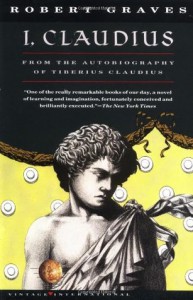 Although this book had its highs and lows, I enjoyed it overall. As others have mentioned, the character names can be very confusing and there is not a genealogy chart included which would have been extremely helpful. It did get easier to keep track of after the first few chapters once I got into the flow of the book. One other thing I didn’t really like was some of the characterizations. Characters are either extraordinarily evil or impossibly noble, with Caligula (of course) being completely batshit insane on top of evil. It was interesting how, beginning with the prudishness of Augustus, each following generation of Claudians became more and more depraved culminating in the reign of Caligula. This is not a book to be read quickly, nor is it a page turner until the end, but it is very engrossing. Claudius is a fascinating character, and while the prose is sometimes a bit dry (especially the parts concerning Germany, for me anyway) he can be wickedly funny. The story is fascinating, and I will pick up the second book soon.
Although this book had its highs and lows, I enjoyed it overall. As others have mentioned, the character names can be very confusing and there is not a genealogy chart included which would have been extremely helpful. It did get easier to keep track of after the first few chapters once I got into the flow of the book. One other thing I didn’t really like was some of the characterizations. Characters are either extraordinarily evil or impossibly noble, with Caligula (of course) being completely batshit insane on top of evil. It was interesting how, beginning with the prudishness of Augustus, each following generation of Claudians became more and more depraved culminating in the reign of Caligula. This is not a book to be read quickly, nor is it a page turner until the end, but it is very engrossing. Claudius is a fascinating character, and while the prose is sometimes a bit dry (especially the parts concerning Germany, for me anyway) he can be wickedly funny. The story is fascinating, and I will pick up the second book soon.
Medicus (Gaius Petreius Ruso, #1)
 I bought this book and its sequel because they were free and 99¢ on the kindle respectively. I was excited to read it but ultimately found it pretty unsatisfying and a bit of a slog. First, it was way too long. Don’t get me wrong, I love long books, particularly historical fiction. But in Medicus, there were entire chapters where virtually nothing happened. They seemed to be there only for more character building, but the main character had been pretty well established from the first chapter, and most secondary characters were two-dimensional. There was no real tension or suspense until the end when the killer was revealed. The pacing was glacially slow, and the plot was bogged down in endless mundane details about hospital bureaucracy.
I bought this book and its sequel because they were free and 99¢ on the kindle respectively. I was excited to read it but ultimately found it pretty unsatisfying and a bit of a slog. First, it was way too long. Don’t get me wrong, I love long books, particularly historical fiction. But in Medicus, there were entire chapters where virtually nothing happened. They seemed to be there only for more character building, but the main character had been pretty well established from the first chapter, and most secondary characters were two-dimensional. There was no real tension or suspense until the end when the killer was revealed. The pacing was glacially slow, and the plot was bogged down in endless mundane details about hospital bureaucracy. Second, as others have mentioned, the historical accuracy was spotty at best. This story really could have taken place anytime and anywhere. The dialogue and characters were thoroughly modern British. The setting felt like one of those backdrops photographers use to make it look like you are standing on a tropical island instead of in their studio. All the major points are there at a glance but there is no depth, and it is obviously completely fake if you look too close. I guess this was really my major complaint with the book – I read historical fiction in large part to be immersed in the setting and historical details, and both were lacking in Medicus.
I should mention that mysteries are not really my thing either, but this one was pretty easy to figure out. I also wish the character of Tilla had been fleshed out a bit more. I liked the few chapters from her point of view, but I would have liked more, along with a decent understanding of what was going on outside the fort from a Briton’s point of view. The book was very poorly edited and had dozens of typos (at least the kindle edition) which was also bothersome.
Overall, I found the story extremely slow and not that interesting. It failed both as historical fiction and as a mystery for me. One thing I did like was that the story focused entirely on the average Roman citizen instead of following Julius Caesar around again. I like reading about what normal everyday citizens were up to in these times, so I enjoyed that aspect of the book. I just wish either the setting had been better realized or the story more engaging, either of which would have saved the book for me.




